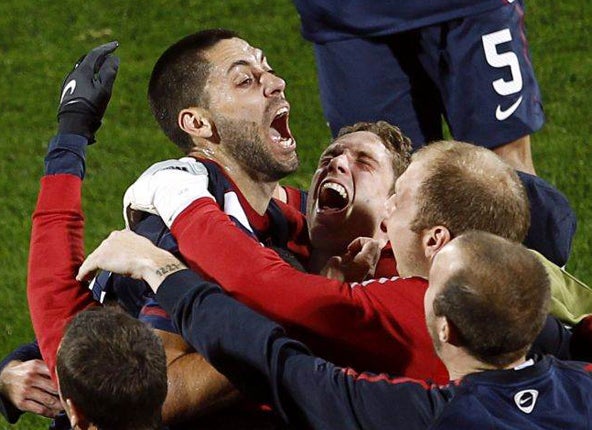Your support helps us to tell the story
From reproductive rights to climate change to Big Tech, The Independent is on the ground when the story is developing. Whether it's investigating the financials of Elon Musk's pro-Trump PAC or producing our latest documentary, 'The A Word', which shines a light on the American women fighting for reproductive rights, we know how important it is to parse out the facts from the messaging.
At such a critical moment in US history, we need reporters on the ground. Your donation allows us to keep sending journalists to speak to both sides of the story.
The Independent is trusted by Americans across the entire political spectrum. And unlike many other quality news outlets, we choose not to lock Americans out of our reporting and analysis with paywalls. We believe quality journalism should be available to everyone, paid for by those who can afford it.
Your support makes all the difference.When Joe Gaetjens deflected the most famous goal ever scored by an American, Alf Ramsey, who was England's right back in Belo Horizonte, would always recall the look of horror on the face of Bert Williams as the leather ball slid through his fingers.
The then England manager, Walter Winterbottom, always regretted that what came to be called "The Miracle on Grass" was never filmed. He reasoned that footage would have demonstrated his side's absolute dominance, which was somehow kept at bay by the heroics of the American keeper, Frank Borghi, whose day job in 1950 was driving hearses in St Louis.
When Robert Green allowed the Jabulani ball to slither through his gloves, the West Ham goalkeeper would have wanted to be buried as completely as Borghi's customers.
In contrast to Williams' error, his would be beamed around the world by satellite and replayed on every DVD of goalkeeping bloopers for decades to come. The pain he suffered may not have been as sharp as that felt by Tim Howard when the toe of Emile Heskey's boots drove into his forearm but it will linger for much longer.
His career will now depend on how he reacts to the disaster of Rustenburg, like Belo Horizonte a town whose fortune was built on mining. Alan Rough, who allowed an equally soft shot through his legs in a 1-1 draw against Iran in the 1978 tournament, never recovered his reputation.
Fabio Capello must hope that Green is not similarly tarnished. As someone who began his career as a teenager by keeping a clean sheet in Norwich's bitter East Anglian derby with Ipswich, he has had to deal early with pressure.
The England footballers in Belo Horizonte thought the little ground resembled a prison yard. In a sense the Royal Bafokeng will be that for Green. He would be grateful that Jozy Altidore's pace midway through the second half gave him an opportunity to show his true ability, although he required the assistance of the post.
However unfortunate his error, it highlighted the one glaringly obvious weakness in Capello's new model England, the lack of a world-class keeper. Throughout England's ponderous preparations for South Africa, Capello, who showed his ability to make quick, ruthless decisions by removing the overstretched James Milner after half an hour, has never appeared clear about who his first choice is.
It may not have helped the manager that David James has "Calamity" for a nickname but he has a reputation for individual brilliance without which Portsmouth would have got nowhere near an FA Cup final.
What is sometimes forgotten when the disasters of 1950 are recalled is that England were without their first-choice central defensive pairing. Billy Wright may have captained the side but his regular partner, Stoke's Neil Franklin, did not travel to Brazil.
Irritated beyond measure by the maximum wage and complaining that the bandsmen at Wembley were paid more than the players, he had fled to Colombia in search of serious money he never really received.
By the time the final whistle went at the Royal Bafokeng, England were on their third choice of centre-halves, John Terry and Jamie Carragher, defenders with plenty of ability and guts but not overburdened with pace.
Both Capello and the USA coach, Bob Bradley, who had asked war veterans to address his players on the virtues of team spirit, had central defenders who had spent much of the season injured. Oguchi Onyewu had only played one match in nine months while Ledley King's knees had had to be nursed through a season at White Hart Lane.
It says something for England's misfortune that the Tottenham captain did not last the night. On the other hand Onyewu, who once had a trial for Newcastle, delivered a heroic performance.
England returned from Belo Horizonte to their hotel on the Copacabana beach a broken team, with not even the return of Stanley Matthews and Jackie Milburn able to prevent elimination by Spain. England were merely dented in Rustenburg but the doubts remain.

Join our commenting forum
Join thought-provoking conversations, follow other Independent readers and see their replies
Comments